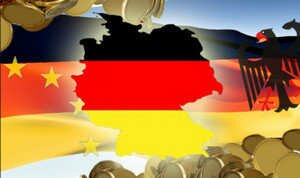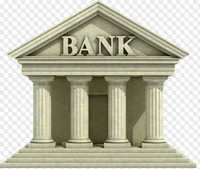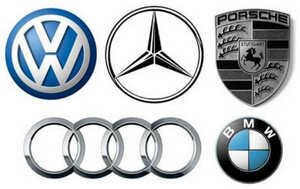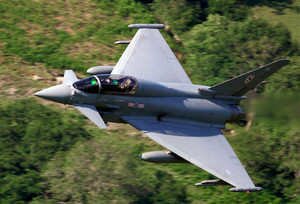
Ivan Sichen
In the context of Russia's ongoing armed aggression against Ukraine, Germany remains our state's main European partner, performing a key role in curbing the Putin regime. The main forms of its actions are sanctions against the Russian Federation, consolidation of the EU's positions to put pressure on Moscow, all-round assistance to Ukraine, as well as participation in the process of settlement of the conflict in the Donbas within the framework of the “Normandy Format”.
All this is being done in order to: consolidate the role of the Federal Republic of Germany, as a leading guarantor of global and European security; to prevent the rebirth of Russia in the status of the former Soviet Union; remind any of the regimes that it definitely will be brought to account for the violation of international norms and principles, as well as to confirm that Germany will carry out its obligations to eastern allies and partners.
This German policy is based on a strong German economy, which occupies one of the leading places in the world after the USA, China and Japan, and in some aspects, its capacity even surpasses their potentials. Thus, Germany's share in total world economy is about 7 % of GDP’s more than three trillion Euros. At this, Germany's economic complex is the most stable and the most competitive among the rest of European Union's countries. This was shown by the global financial and economic crisis of 2008-2009, which though covered Germany quite tangibly, did not actually destroy its economy.
The Top Ten Countries by GDP (PPP) as of 2015
according to the World Bank, IMF, CIA (in billion US dollars)
|
№ |
Countries |
The World Bank |
IMF |
CIA
|
|
1 |
China |
18,017 |
19,392 |
19,510 |
|
2 |
USA |
17,419 |
17,947 |
17,970 |
|
3 |
India |
7,384 |
7,965 |
8,027 |
|
4 |
Japan |
4,630 |
4,830 |
4,658 |
|
5 |
Germany |
3,705 |
3,841 |
3,842 |
|
6 |
Russia |
3,745 |
3,718 |
3,471 |
|
7 |
Brasil |
3,263 |
3,192 |
3,166 |
|
8 |
Indonesia |
2,676 |
2,842 |
2,839 |
|
9 |
France |
2,571 |
2,647 |
2,647 |
|
10 |
Britain |
2,565 |
2,679 |
2,660 |
Already in 2010-2013, the FRG's economy overcame the crisis, having resumed the positive dynamics of development. In 2014, Germany's GDP increased by 1.6 %, in 2017 — by 1.7 %, the forecast for 2016 is at the level of 1.9-2 %. Notable that the Federative Republic of Germany's sanctions against Russia and the latter's reciprocal countermeasures have had little impact on the German economy, despite the Putin regime's great hopes. The economic potential of Germany is almost an order of magnitude greater than the economic capabilities of Russia, so Berlin successfully carries out the policy of pressure on Moscow.
By the way, the crisis processes in the world economy and in the financial and economic system have strengthened Germany's positions in the European Union as its main financial donor. Germany's economy was a key stabilizing factor, which kept the European Union on the verge of global problems. Thus, since 2008, the FRG's contribution to the stabilization of the EU funds has amounted to about 22 billion Euros, which has become a prerequisite for this Organization's overcoming the economic crisis.
Thanks to this, Germany has received a priority right to influence European Union policy in solving its economic problems, consistent implementation of a common European policy (defence and security included) towards the Russian Federation.
In general, the FRG's economic achievements directly depend on the effective policy of its government, the material and technical base of its economic complex and the use of the latest world-class technologies.
The economic policy of the government of Germany is socio-market one in nature, which provides a reasonable compromise between the growth of the economy and equitable distribution of profits in the society. This provides common interests of the owners of German companies and the direct producers of material products and services in high-quality work of Germany's economy, which is the reason for its high results.
The main structural components of Germany's economic complex are high-tech services, mechanical, electrical, electronic, aerospace and naval engineering, metallurgy, chemistry, energy, agriculture and food industry.
In particular, the FRG's sphere of services generates more than two-thirds of the country's GDP, and ensures jobs for about 53 % of the German population. First of all, it includes support of the banking and financial system of the state, as well as the work of trade and transport.
 For example, the banking and financial system of Germany is the main driver of the German economy. The country's leading banks, in particular, Deutsche Bank, Dresdner Bank and at Commerzbank, act as the main domestic investors in Germany, and effectively control the national securities market. All this determines their leading role in the activities of the German business, including the correction of individual companies’ activities and appointment of their leaders.
For example, the banking and financial system of Germany is the main driver of the German economy. The country's leading banks, in particular, Deutsche Bank, Dresdner Bank and at Commerzbank, act as the main domestic investors in Germany, and effectively control the national securities market. All this determines their leading role in the activities of the German business, including the correction of individual companies’ activities and appointment of their leaders.
Consequently — powerful financial and industrial associations of large companies and related small and medium firms are formed around FRG's banks. An example is a group of Deutsche Bank, including commercial and mortgage banks, investment and leasing companies, specialized consulting firms, insurance companies and international financial institutions. With the financial unit of the group are closely related numerous industrial enterprises, including the car giant Daimler Benz, trading house Karstadt, metallurgical concern Metallgesellshaft and construction firm Holzmann.
German banks are actively working on foreign finance and investment markets, primarily in the United States and the European Union. In particular, due to the Deutsche Bank's having bought the US bank Bankers Trust Corporation, one of the world's largest international financial institutions has been established.
Apart from banking activities, another important sphere of services in Germany is trade industry. Germany's retailers and supermarket chains (e.g. Metro) traditionally are at the top of the ranking list of German business. And they are widely represented both in Germany and abroad.
In the sphere of services, an equally important role in Germany's economy is played by its transport infrastructure. It includes high-quality highways, railways, powerful transport and logistics centers, in particular, the airports in Frankfurt, Düsseldorf and Munich and seaports of Hamburg and Bremen.
 In turn, the German automotive industry is a major engineering industry. The German car industry is represented by companies of Volkswagen Group, Opel, Daimler, BMW, Mercedes — Benz, Audi, MAN and Porsche — the largest German companies, producing more than 5 million vehicles of different classes a year.
In turn, the German automotive industry is a major engineering industry. The German car industry is represented by companies of Volkswagen Group, Opel, Daimler, BMW, Mercedes — Benz, Audi, MAN and Porsche — the largest German companies, producing more than 5 million vehicles of different classes a year.
Thus, the Volkswagen Company alone annually manufactures products worth about 200 billion Euros and employs 570 thousand people (of them — 260 thousand in Germany and more than 300 thousand — abroad). Besides, among the leading participants in the German automotive industry are German car factories of the American concern Ford, Robert Bosch Company, ThyssenKrupp, Continental and ZF Friedrichshafen AG, which largely build their business in production of auto parts, components and manufacturing equipment.
Germany's engineering industry includes assembling machines and other equipment for industrial enterprises, production of agricultural machinery, heavy machines, including cranes, bridges, mining, metallurgical and power equipment.
A leading sector of the German economy is also the electrotechnical industry. It is represented by conglomerates Siemens AG, Hager, Robert Bosch GmbH, as well as by several hundred other companies with different profiles and work capacity. This industry manufactures both industrial products (generators, cables, transformers, etc.) and household durables (refrigerators, washing machines, microwave ovens, vacuum cleaners, electric tools, and so on).
At some point of time, from the German electrical industry there stood out electronic industry — the most high-tech industry in Germany. The rapid development of these industries is due to the introduction of information technology, creation of the country's nuclear industry, orders of the military-industrial complex, presence of research centers and highly-skilled workforce.
Another driver of the German economy is the aerospace industry. It provides the entry into the country of high modern technologies. They are, first of all, achievements in the spheres of electronics, robotics, measuring and control technologies, as well as creation and use of new materials. Thanks to this, Germany is involved in the production of various aviation and space machinery — from light aircrafts and helicopters to long-range Airbuses.
The turnover in the aerospace industry of Germany is more than 15 billion Euros per year, and about 70 thousand people work in it. The share of the civil aviation in the overall structure of the industry is 68%, of the military — 23%, and of the aerospace industry — 9%. In aerospace construction in Germany there are about 150 companies, the main of which being EADS and Eurocopter.
Germany is also one of the leading EU countries in the shipbuilding industry, which employs nearly 1 million people at 400 enterprises. The most powerful of these are the German shipyard Flensburger Schiffbau — Gesellschaft, ThyssenKrupp Marine Systems, Lurssen, Aker Yards Germany and Meyer Neptun Group, which assemble vessels of all types and purposes. However, like in other countries, the amount of shipbuilding products in Germany depends on the internal and external demand, which adversely affects the stability of the whole industry.
 The military-industrial complex is a separate component of Germany's economy. Here Germany is working closely with its NATO and EU partners. For example, within the framework of the European consortium EADS, the German companies involved in the development and production of space machinery, fighters of the generation “4+” EF2000 “Typhoon”, promising military transport aircrafts, as well as modern missile systems and air defense.
The military-industrial complex is a separate component of Germany's economy. Here Germany is working closely with its NATO and EU partners. For example, within the framework of the European consortium EADS, the German companies involved in the development and production of space machinery, fighters of the generation “4+” EF2000 “Typhoon”, promising military transport aircrafts, as well as modern missile systems and air defense.
At the same time, German companies produce the whole range of weapons for troops on the ground, including armored vehicles, artillery and multiple rocket launchers, anti-tank missiles, tactical air defense means, helicopters, small arms and ammunition. Germany alone meets the needs of its Navy middle-class warships, boats and submarines.
The structure of the military-industrial complex of Germany includes about 80 major companies and has over two thousand companies producing parts and components. Most of them are subsidiaries of large German companies Rheinmetall, Krauss-Maffei Wegmann, ThyssenKrupp AG, Siemens AG, etc.
Apart from services and engineering, quite prominent in the economic complex of the FRG are its light industry, agriculture and food production.
Germany's light industry produces textiles, clothing, footwear, leather goods and such like. Companies of the industry, in particular, “Picard”, have a wide network of branches in other countries, including in Ukraine.
Germany's agriculture is up to other branches of the German economy by its efficiency and high-tech nature. Despite the fact that it employs only 2-3% of the working population, it fully meets Germany's domestic demand for the main types of food. Mainly through the use of modern agro-technologies in the agriculture of the country, including a comprehensive automation and mechanization of agricultural operations. At this, agricultural goods are produced by both, small family farms and large industrial-type enterprises. They use labor of seasonal workers, mainly from less developed countries.
About 70% of Germany's marketable products are provided by livestock farming. Germany is also one of the largest grain producers among the European Union countries. Many varieties of fruit and vegetable crops are cultivated in the country.
The work of the above-mentioned sectors of Germany's economy is based on other important components of the economic complex of the FRG, in particular — metallurgical and chemical industries, as well as energy engineering.
In metallurgy, by the steel production volume — more than 43 million tons per year (2.7% of global share) — Germany ranks seventh in the world and first in the European Union. Steel and cast iron are produced by nearly 180 companies with a total of 98 thousand workers. The largest of these are ThyssenKrupp and Zalzgitter AG concerns. Their consolidated profit is averagely 45-46 billion Euros a year.
Germany's metallurgical industry also produces a wide range of other products, including “light metals” (aluminum, magnesium, titanium), “non-ferrous metals” (copper, zinc, nickel, lead, tin) and “rare earth metals” (tungsten, tantalum, bismuth, etc.). 110 thousand people are working for 660 German companies in this sphere. The annual output of non-ferrous metals in Germany is 8 million tons worth about 50 billion Euros.
Germany's chemical industry is also among the world leaders, being third only to the United States and Japan. German companies produce the whole list of chemical products — from organic chemical products, plastics and fertilizers to medicines and cosmetics. It uses both imported and local raw materials (including coal, potash, sulfur ore, petroleum, and natural gas). Bayer, BASF, Henkel Group, Hoechst AG corporations and Siemens conglomerate are considered the largest enterprises of the German chemical industry. They employ over 500 thousand people. One-half of their products goes to the domestic market, while the other half is exported.
Taking into account the volumes of the German economy, Germany is one of the largest producers and consumers of energy resources — at the level of about 525 million tons per year of oil equivalent. Of these, 35 % are oil, 25 % — coal, 23 % — natural gas, 7 % — nuclear energy, 1.4 % — hydropower and 8.6 % — other renewable energy sources.
Nevertheless, Germany does not have the necessary natural resources. Thus, Germany only partially provides its own needs in coal and oil (10 %) and gas (25 %). Therefore, Germany has to import most of energy carriers from other countries, in particular from the Middle East, North Africa, Russia (oil and gas) and the USA (nuclear fuel for NPPs).
These are all features of the German energy market, where there are both German and numerous foreign companies. In particular, Germany's main energy companies are E.ON, RWE, EnBW and Wintershall. In turn, foreign energy business is represented by subsidiaries of leading foreign corporations BP, Shell, Vattenfall, Total, ExxonMobil, and Gazprom.
 In this situation, Germany's government is actively trying to convert the country's energy system to renewable energy carriers. Over the next ten years, the share of such energy carriers in the energy balance of the country is expected to reach 20 %, which would allow Germany to significantly increase its energy and environmental security. These questions are especially relevant for the Federal Republic of Germany under the aggravated situation in the Middle East and North Africa, Russia's growing aggressiveness and anti-Western policy, as well as the precedent of the accident at the nuclear power plant Fukushima-1 in Japan in March 2011, which demonstrated the danger of nuclear energy.
In this situation, Germany's government is actively trying to convert the country's energy system to renewable energy carriers. Over the next ten years, the share of such energy carriers in the energy balance of the country is expected to reach 20 %, which would allow Germany to significantly increase its energy and environmental security. These questions are especially relevant for the Federal Republic of Germany under the aggravated situation in the Middle East and North Africa, Russia's growing aggressiveness and anti-Western policy, as well as the precedent of the accident at the nuclear power plant Fukushima-1 in Japan in March 2011, which demonstrated the danger of nuclear energy.
The determining factor in the achievements of the German economy is the high level of scientific and technological progress in the country, which is based on the German government's support to private business. For example, in terms of volumes of expenditures for scientific and technical purposes (approximately 3 % of GDP) and in their absolute value, Germany is among the top five countries. Mainly these funds are allocated to research in engineering, aerospace, electronics, chemical and medical industries. Besides, Germany actively participates in implementation of international scientific programs, both at the bilateral level and within the framework of various associations and organizations.
The advanced nature of the German economy is due to the high level of its export oriented and, accordingly, the country's close integration into the global economic system. Currently, Germany's exports make about 30 % of its GDP. At the same time, by the volume of foreign trade and investment, Germany ranks one of the first in the world — at the level of the USA, China and Japan.
Taking into consideration of the structure of the economic complex of the FRG, the main articles of Germany's exports are products of engineering (mainly automobiles, ships, industrial machinery and equipment) and chemical industry; electronic and electrical products (consumer and computing equipment) and some types of food. Besides, a prominent place is given to the sale of intellectual property, including modern technologies. In general, Germany exports goods worth more than 1 billion Euros a year.
At the same time, Germany imports minerals, semi-finished products, energy, timber and wood products, some types of industrial and food products that are not produced in the country. The total volume of Germany's imports is approximately 900 million Euros.
The FRG's main foreign economic partners are the EU countries, the USA, China and India. Germany is also intensifying its economic and trade cooperation with the countries of the former Soviet Union, including Ukraine. Russia's armed aggression against Ukraine and Germany's political and economic sanctions against V. Putin’s regime have significantly reduced communication between Germany and the Russian Federation.
In general, all this makes the basis, determining the role of Germany as one of the leading countries in the world, and allowing it to successfully implement its national interests at both European and global levels.

